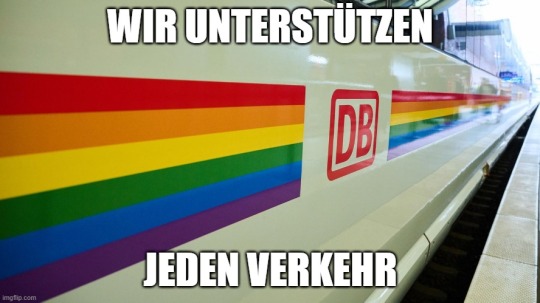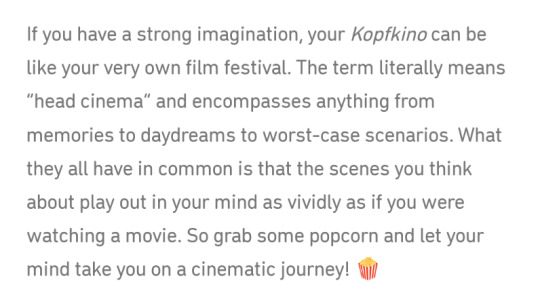#germanblr
Photo

Happy Pride :)
6K notes
·
View notes
Text
friendly reminder that the german police made a checklist on how to identify lefties (read "a guide on how to profile and stereotype civilians") and gave it to workers of the railway with the request to report those lefties
because people were demonstrating against unfair harshness in the prosecution of a left terrorist (compared to prosecutions of right terrorism)
this list included "dreadlocks, undergrads, members of Gen Z"
not a lot of people talk about this anymore so let it resurface
(german article, and the only one i could find
if you have other articles, please reblog and add)
518 notes
·
View notes
Text
Liebe Deutsche,
der Entwurf fürs Selbstbestimmungsgesetz ist endlich da, enthält aber leider einige Paragraphen, die diskriminierend sind und Misstrauen gegenüber TIN* Menschen ausdrücken, deshalb ist eine Eil-Petition gestartet, um die entsprechenden Paragrafen aus dem Gesetzesentwurf zu streichen!
Zitat aus der Beschreibung der Petition:
"Nachdem die zuständigen Ministerien den Gesetzentwurf Anfang Mai vorstellten, warnten zahlreiche Fachverbände und Selbstorganisationen Bundesministerin Paus und Bundesminister Buschmann eindringlich: Einzelne Regelungen im Entwurf führen zu Diskriminierungen und Ausschlüssen für trans*, intergeschlechtliche und nicht-binäre Menschen.
Von diesem wertvollen Expert*innenwissen wurde im Kabinettsentwurf [der] Bundesregierung jedoch nichts berücksichtigt. Das ist ein unhaltbarer Zustand! Nach wie vor finden sich im Entwurf Formulierungen, die trans*, intergeschlechtlichen und nicht-binären Menschen gegenüber Misstrauen ausdrücken. Statt ihre Lebensrealitäten zu berücksichtigen, wird weiter Vorurteilen Raum gegeben.
Wir fordern Sie auf: Überarbeiten Sie den Gesetzesentwurf entsprechend der Forderungen der trans*, inter und nicht-binären Fachverbände und Selbstorganisationen! Nur so wird aus dem Entwurf ein wirkliches Selbstbestimmungsgesetz."
Hier geht's zur Petition: https://innn.it/jazuselbstbestimmung
#deutschblr#germanblr#deutschland#deutsches zeug#deutsche politik#petition#selbstbestimmungsgesetz#weiß nicht was ich sonst noch alles taggen soll
427 notes
·
View notes
Text
#german stuff#deutsches zeug#germanblr#state poll#poll#for me 🍔 bc it's mainly wenns mal in die große Stadt geht als Dorfkind aus Niedersachsen
298 notes
·
View notes
Text

I love Wikis dedicated to one specific fandom
676 notes
·
View notes
Text

HELLO????
316 notes
·
View notes
Text
The Duolingo blog has given me my new absolute favourite German word:
das Kopfkino

#langblr#language learning#learning languages#german language#learning german#germanblr#linguistics#duolingo#duolingo german#my posts
154 notes
·
View notes
Text
Germanblr aufgepasst, this is not a drill!
Ich hab heute im Aldi Spekulatius gesehen. Und Dominosteine. Und Christstollen.
Ich mein, es ist ja schon September...
I repeat, this is not a drill.
184 notes
·
View notes
Text

Von meinem epischen insta judasfag :)
53 notes
·
View notes
Text
Like if you speak German
66 notes
·
View notes
Text
Transfem docm77
call that docf77
#hermitcraft#docm77#minecraft#hermitblr#transgender#transfemme#trans femme#trans fem#transfem#trans#queer#lgbt#lgbtq#lgbtqia#lesbian#germanblr#funny#meme#lgbtq+#lgbtqia+#science
38 notes
·
View notes
Text
Vorschlag für Germanblr
statt Myers-Briggs oder Hogwarts-Haus fügen wir einfach die bevorzugte Bezeichnung hierfür dem Profil hinzu:

64 notes
·
View notes
Text
160 notes
·
View notes
Text
92 notes
·
View notes
Text
Jetzt heißt es in den Nachrichten dass es doch keine Löwin war, sondern nur ein Wildschwein... :(

699 notes
·
View notes
Text
Here to once again sing the praises of Duolingo (and go on a long ramble about language learning)
I see a fair bit of criticism of Duo that essentially begins and ends with “Duolingo alone won't make you fluent”, stated as if it's obvious that this point alone is enough to totally condemn the app.
The thing is, “Duolingo alone won't make you fluent” is true*, but also a) pretty obvious to most dedicated language learners and b) not nearly enough to automatically render Duolingo not worth using.
[*It's also worth pointing out that “fluency” isn't really a single coherent concept: people can have radically different fluency levels across, for example, reading and speaking; different levels of proficiency can count as “fluent” in different settings depending on the needs of that setting; and not everyone learning a language is even aiming for “fluency” in the first place - though this also leads into a huge can of worms about the somewhat prevalent idea that fluency is the only worthwhile goal for learners and if you're not aiming to be fluent then it's a waste of time, but that's a discussion for another day.]
The value of Duolingo varies a lot by course, but my experience is that even though Duolingo alone won't “make you fluent”, the bigger, better-developed courses can take you a long way. Yes, obviously not to C2 “basically a native speaker” level, but pretty far. And that's personally where I find the app's real value: giving enough of a grounding in a language that other learning materials - short stories, podcasts, conversation groups, etc - become accessible. Of course Duolingo alone isn't going to make you fluent, but for a lot of learners it's an irreplaceable early tool on their journey towards proficiency.
Early on, when your level of knowledge of a language is zero or near-zero, so much of the struggle of learning is a feeling of total overwhelm as you try to figure out how to learn and find a method you'll stick to. Independent learning can feel like walking blindly through a maze of disparate and sometimes contradictory resources, some on grammar, some on vocab, some that say “start speaking immediately!”, some that say “get to grips with these grammar foundations before even trying to speak!”, some that insist there's no replacement for immersion, some that argue that immersion is like being thrown in the deep end and expecting yourself to swim, and this is where so many people burn themselves out. You can't read short stories or listen to podcasts when you know literally nothing of a language, and if you use a random unstructured assortment of materials then you'll probably end up learning grammar concepts in a very random and disconnected and confusing way. Duolingo bridges that early gap between “zero proficiency” and “some proficiency”, providing a structure that says “just keep doing this and you will watch your ability grow”.
Really, I think it's in precisely what “doing this” means that the disagreement arises. It's a very YMMV app, depending on how each person uses it. Someone using Duolingo for >30 minutes a day, making rapid and intense progress through their course, and seeking out alternative sources to clarify bits of grammar that they're confused by is having such a different experience from someone who does one lesson a day just to keep a streak going. Of course someone doing the latter isn't going to be “made fluent” that way - because there is no language-learning material on earth that is going to produce genuine progress with that little time and attention (and frankly there is no material on earth that is a 100% comprehensive standalone course from beginner to fluent and doesn't require any supplementation). Regardless of which material you're using - Duolingo, Babbel, Rosetta Stone, LanguagePod101, a YouTube series, a university course, a textbook, or any of the many other miscellaneous methods - time and attention is basically what it comes down to, and personally, in the beginner-to-intermediate stages of language learning, I've found Duolingo to have a pretty good ratio of “time and attention” to “language progress”.
Ultimately, Duo can be excellent at holding your hand through those early months of language learning, getting you to a point where you don't use “Duolingo alone”, because you now have enough confidence and grounding to supplement with things like short stories and podcasts and conversation partners - things that you would have found unbelievably daunting at the beginning, but that are now accessible to you thanks to a free app that guides you through a clear learning structure. I think that's great.
Zu lang, ich habe nicht gelesen - vielleicht bin ich noch nicht fließend, aber ich kann viel mehr mit Duo als ohne Duo sprechen :)
#duolingo#languages#language learning#learning languages#langblr#germanblr#german#learning german#linguistics#my posts
74 notes
·
View notes